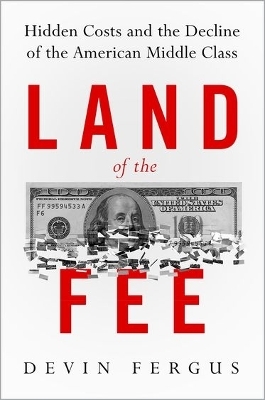
Land of the Fee
Hidden Costs and the Decline of the American Middle Class
Seiten
2018
Oxford University Press Inc (Verlag)
978-0-19-997016-2 (ISBN)
Oxford University Press Inc (Verlag)
978-0-19-997016-2 (ISBN)
Land of the Fee exposes the barely visible system of fees that pervades everyday life in America, and explores how this system has shaped wealth inequality in contemporary America.
Politicians, economists, and the media have put forth no shortage of explanations for the mounting problem of wealth inequality - a loss of working class jobs, a rise in finance-driven speculative capitalism, and a surge of tax policy decisions that benefit the ultra-rich, among others. While these arguments focus on the macro problems that contribute to growing inequality, they overlook one innocuous but substantial contributor to the widening divide: the explosion of fees accompanying virtually every transaction that people make.
As Devin Fergus shows in Land of the Fee, these perfectly legal fees are buried deep within the verbose agreements between vendors and consumers - agreements that few people fully read or comprehend. The end effect, Fergus argues, is a massive transfer of wealth from the many to the few: large banking corporations, airlines, corporate hotel chains, and other entities of vast wealth. Fergus traces the fee system from its origins in the deregulatory wave of the late 1970s to the present, placing the development within the larger context of escalating income inequality. He organizes the book around four of the basics of existence: housing, work, transportation, and schooling. In each category, industry lobbyists successfully influenced legislatures into transforming the law until surreptitious fees became the norm.
The average consumer is now subject to a dizzying array of charges in areas like mortgage contracts, banking transactions, auto insurance rates, college payments, and payday loans. The fees that accompany these transactions are not subject to usury laws and have effectively redistributed wealth from the lower and middle classes to ultra-wealthy corporations and the individuals at their pinnacles. By exposing this predatory and nearly invisible system of fees, Land of the Fee will reshape our understanding of wealth inequality in America.
Politicians, economists, and the media have put forth no shortage of explanations for the mounting problem of wealth inequality - a loss of working class jobs, a rise in finance-driven speculative capitalism, and a surge of tax policy decisions that benefit the ultra-rich, among others. While these arguments focus on the macro problems that contribute to growing inequality, they overlook one innocuous but substantial contributor to the widening divide: the explosion of fees accompanying virtually every transaction that people make.
As Devin Fergus shows in Land of the Fee, these perfectly legal fees are buried deep within the verbose agreements between vendors and consumers - agreements that few people fully read or comprehend. The end effect, Fergus argues, is a massive transfer of wealth from the many to the few: large banking corporations, airlines, corporate hotel chains, and other entities of vast wealth. Fergus traces the fee system from its origins in the deregulatory wave of the late 1970s to the present, placing the development within the larger context of escalating income inequality. He organizes the book around four of the basics of existence: housing, work, transportation, and schooling. In each category, industry lobbyists successfully influenced legislatures into transforming the law until surreptitious fees became the norm.
The average consumer is now subject to a dizzying array of charges in areas like mortgage contracts, banking transactions, auto insurance rates, college payments, and payday loans. The fees that accompany these transactions are not subject to usury laws and have effectively redistributed wealth from the lower and middle classes to ultra-wealthy corporations and the individuals at their pinnacles. By exposing this predatory and nearly invisible system of fees, Land of the Fee will reshape our understanding of wealth inequality in America.
Devin Fergus is a Senior Fellow at Demos and Associate Professor at The Ohio State University. Author of Liberalism, Black Power, and the Making of American Politics (a CHOICE Outstanding Title for 2010), he has written widely on politics, policy, and inequality in outlets such as The New York Times, The Washington Post, The American Prospect, The Guardian, and The Atlanta Journal-Constitution.
List of Figures
Acknowledgements
Introduction
1. House Money: The Story of Subprime in Three Acts
2. Tax Eaters: The Origins of the Student Debt Bubble
3. Driving While Broke: How Auto Insurance Drives the Wealth Gap
4. Shadow Bankers and the Great Wage Stagnation: The Story of Payday Lending
Epilogue
Notes
Index
| Erscheinungsdatum | 13.08.2018 |
|---|---|
| Verlagsort | New York |
| Sprache | englisch |
| Maße | 236 x 163 mm |
| Gewicht | 485 g |
| Themenwelt | Geisteswissenschaften ► Geschichte ► Regional- / Ländergeschichte |
| Geschichte ► Teilgebiete der Geschichte ► Wirtschaftsgeschichte | |
| Recht / Steuern ► EU / Internationales Recht | |
| Sozialwissenschaften ► Politik / Verwaltung ► Staat / Verwaltung | |
| Sozialwissenschaften ► Soziologie ► Makrosoziologie | |
| Wirtschaft ► Allgemeines / Lexika | |
| ISBN-10 | 0-19-997016-5 / 0199970165 |
| ISBN-13 | 978-0-19-997016-2 / 9780199970162 |
| Zustand | Neuware |
| Informationen gemäß Produktsicherheitsverordnung (GPSR) | |
| Haben Sie eine Frage zum Produkt? |
Mehr entdecken
aus dem Bereich
aus dem Bereich
Macht und Herrschaft im Zarenreich
Buch | Hardcover (2024)
C.H.Beck (Verlag)
49,90 €
wie die USA und China um die technologische Vorherrschaft auf der …
Buch | Hardcover (2023)
Rowohlt (Verlag)
30,00 €


